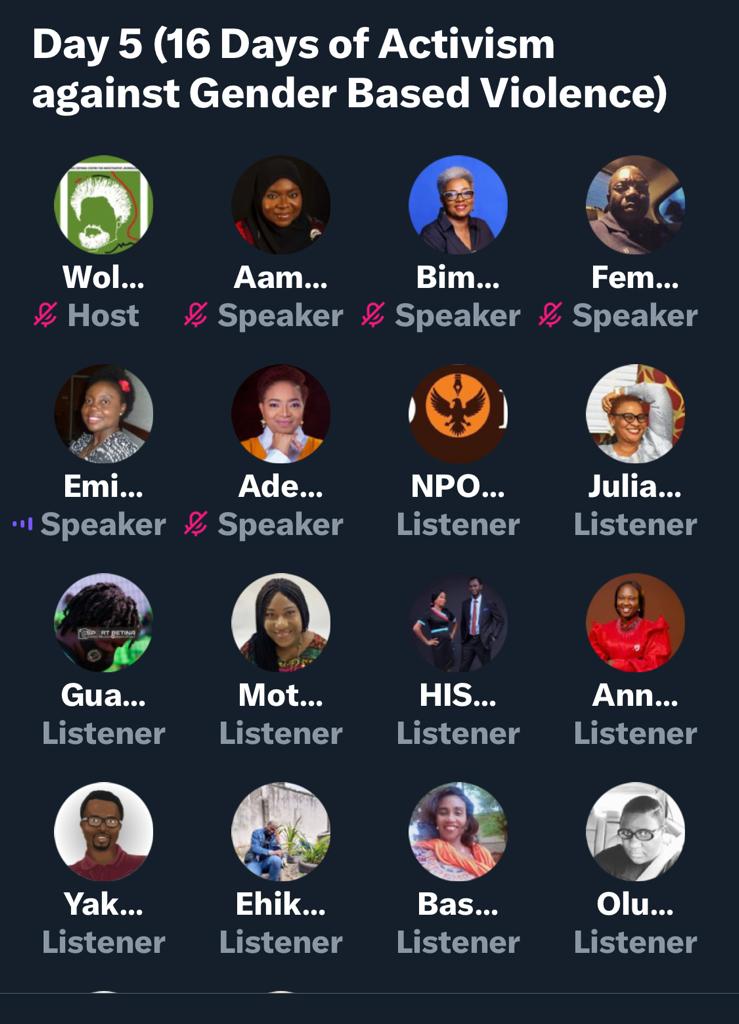By Halimah Olamide
Industry experts on Wednesday, highlighted various forms of emotional manipulation and psychological violence and how they affect the society.
This was the topic of discussion on Day 5 of the Wole Soyinka Center for Investigative Journalism 16 Days of Activism Against Gender-Based Violence themed: “How Real is Psychological Violence and Emotional Manipulation in Homes and Offices?”
Dr. Femi Olugbile, a psychiatrist and the former Chief Medical Director, Lagos State University Teaching Hospital, stated that psychological injury is often not taken as seriously as physical injuries. He said this is because people are weary of forming opinions on subtle things and because it has passed under the radar of social condemnation, people who emotionally abuse others tend to operate more freely.
Olugbile further stated that in most cases, suicide acts are usually a result of injuries that they may have suffered under the guise of psychological violence.
He also stated that the process of child-rearing requires psychological reshaping in order to groom adults who are able to decipher rights from wrongs in the society.
“Because they’ve passed under the radar of social condemnation, they tend to operate more freely.
“Sometimes, we can injure a person psychologically that he can go and commit suicide. Some of the best killing acts that we’ve seen people commit in our society have been due to unacceptable, unbearable injury that they suffered psychologically as a result of violence that is applied against them at a psychological level.
“Psychological violence exists but unfortunately, there are some things in our society that encourage and sustain it.
“All of our social responses are geared towards perpetuating these things because we don’t acknowledge them and it can be so catastrophic to the point one or two persons may lose their lives.
“The whole process of child-rearing requires a lot of psychological shaping
“If we are over-inclusive then everybody will do what they like and children will grow up to be adults who do not have any sense of what is right and wrong.”
Therapist and Mental Coach, Adeola Kingsley-James, narrated her personal experience of having felt like she was bullied as a child growing up in Nigeria and how those experiences had an impact and shaped her perspective on life and issues even as an adult.
She highlighted the practices often practiced by many adults in society of bullying and manipulating children and how these actions may groom them to not be able to stand up for themselves.
“I personally believe we were manipulated and bullied as children and just because of the fact that you think a child is a child and they don’t have feelings,
“You go to school, class, and the same thing happens. There is comparison and competition happening in classes and that itself manipulation.
“Nobody does anything to you except the way you teach them to treat you which then means you feel little about yourself and if you feel so, you’re going to make people see you as little and you’re going to project that they are the ones doing it to you when at the end of the day, you are the one doing it to yourself.
“I think that whatever shows up today is what has been deposited in us and how we have seen people treat us all the while and we think it is okay and deep down, we hate what’s happening but we’re not empowered enough to say what is going on until you become empowered.”
Also speaking on how women can overcome psychological and emotional violence, especially in their marriages, she noted that most women who are often tied down in psychologically violent homes are often unable to leave due to financial instability.
She however urged women to ensure they are empowered financially and have a source of income.
“A lot of women who have had to take these things in said they are not financially stable and I always say this, we all need to have our money
Ameenah Yunus-Ali, a lead coach of Timeless Soul Inc. provided insights as to methods that can be adopted in reducing the rate of psychological violence by re-orientating men on recognizing their values.
“We need to help the men recognize their own value and essence away from assuming that their manhood is designed only if and when another human being submits to them because this is where the endangerment of women lies right now.
“We need to begin to teach men how to be wholesome men, how vulnerability plays a huge role in the relationship that they have, we also need to help men develop that self-esteem and confidence that relies on their competence and their capabilities rather than patriarchal discussions of the past.” She said.


